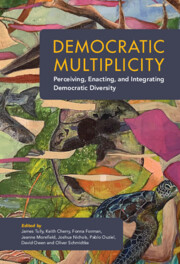24 results
Part II - Representative Democracies
-
- Book:
- Democratic Multiplicity
- Published online:
- 21 July 2022
- Print publication:
- 04 August 2022, pp 63-124
-
- Chapter
-
- You have access
- Open access
- HTML
- Export citation
Part V - International/Global Democracies
-
- Book:
- Democratic Multiplicity
- Published online:
- 21 July 2022
- Print publication:
- 04 August 2022, pp 305-346
-
- Chapter
-
- You have access
- Open access
- HTML
- Export citation
Part IV - Indigenous Democracies
-
- Book:
- Democratic Multiplicity
- Published online:
- 21 July 2022
- Print publication:
- 04 August 2022, pp 193-304
-
- Chapter
-
- You have access
- Open access
- HTML
- Export citation
Part I - Democratic Ethos
-
- Book:
- Democratic Multiplicity
- Published online:
- 21 July 2022
- Print publication:
- 04 August 2022, pp 23-62
-
- Chapter
-
- You have access
- Open access
- HTML
- Export citation
Part VI - Joining Hands: Eco-Democratic Integration
-
- Book:
- Democratic Multiplicity
- Published online:
- 21 July 2022
- Print publication:
- 04 August 2022, pp 347-388
-
- Chapter
-
- You have access
- Open access
- HTML
- Export citation
Tables
-
- Book:
- Democratic Multiplicity
- Published online:
- 21 July 2022
- Print publication:
- 04 August 2022, pp ix-ix
-
- Chapter
-
- You have access
- Open access
- HTML
- Export citation
Contributors
-
- Book:
- Democratic Multiplicity
- Published online:
- 21 July 2022
- Print publication:
- 04 August 2022, pp x-xvi
-
- Chapter
-
- You have access
- Open access
- HTML
- Export citation
Part III - Local/Global Participatory Democracies
-
- Book:
- Democratic Multiplicity
- Published online:
- 21 July 2022
- Print publication:
- 04 August 2022, pp 125-192
-
- Chapter
-
- You have access
- Open access
- HTML
- Export citation
Author Index
-
- Book:
- Democratic Multiplicity
- Published online:
- 21 July 2022
- Print publication:
- 04 August 2022, pp 423-425
-
- Chapter
-
- You have access
- Open access
- HTML
- Export citation
Figures
-
- Book:
- Democratic Multiplicity
- Published online:
- 21 July 2022
- Print publication:
- 04 August 2022, pp viii-viii
-
- Chapter
-
- You have access
- Open access
- HTML
- Export citation
Bibliography
-
- Book:
- Democratic Multiplicity
- Published online:
- 21 July 2022
- Print publication:
- 04 August 2022, pp 389-422
-
- Chapter
-
- You have access
- Open access
- HTML
- Export citation
Subject Index
-
- Book:
- Democratic Multiplicity
- Published online:
- 21 July 2022
- Print publication:
- 04 August 2022, pp 426-436
-
- Chapter
-
- You have access
- Open access
- HTML
- Export citation
Contents
-
- Book:
- Democratic Multiplicity
- Published online:
- 21 July 2022
- Print publication:
- 04 August 2022, pp v-vii
-
- Chapter
-
- You have access
- Open access
- HTML
- Export citation
7 - For a Politics of Exile
- from Part II - Representative Democracies
-
-
- Book:
- Democratic Multiplicity
- Published online:
- 21 July 2022
- Print publication:
- 04 August 2022, pp 110-124
-
- Chapter
-
- You have access
- Open access
- HTML
- Export citation
Copyright page
-
- Book:
- Democratic Multiplicity
- Published online:
- 21 July 2022
- Print publication:
- 04 August 2022, pp iv-iv
-
- Chapter
-
- You have access
- Open access
- HTML
- Export citation
Acknowledgments
-
- Book:
- Democratic Multiplicity
- Published online:
- 21 July 2022
- Print publication:
- 04 August 2022, pp xxi-xxii
-
- Chapter
-
- You have access
- Open access
- HTML
- Export citation

Democratic Multiplicity
- Perceiving, Enacting, and Integrating Democratic Diversity
-
- Published online:
- 21 July 2022
- Print publication:
- 04 August 2022
-
- Book
-
- You have access
- Open access
- Export citation
8 - Challenging Liberal Belief
-
-
- Book:
- Empire, Race and Global Justice
- Published online:
- 21 February 2019
- Print publication:
- 21 February 2019, pp 184-210
-
- Chapter
- Export citation
Chapter 7 - Said and Political Theory
-
-
- Book:
- After Said
- Published online:
- 21 December 2018
- Print publication:
- 13 December 2018, pp 112-128
-
- Chapter
-
- You have access
- HTML
- Export citation
Andrew Sartori. Liberalism in Empire: An Alternative History. Berkeley Series in British Studies. Oakland: University of California Press, 2014. Pp. 288. $39.95 (paper).
-
- Journal:
- Journal of British Studies / Volume 55 / Issue 2 / April 2016
- Published online by Cambridge University Press:
- 11 March 2016, pp. 442-444
- Print publication:
- April 2016
-
- Article
- Export citation



